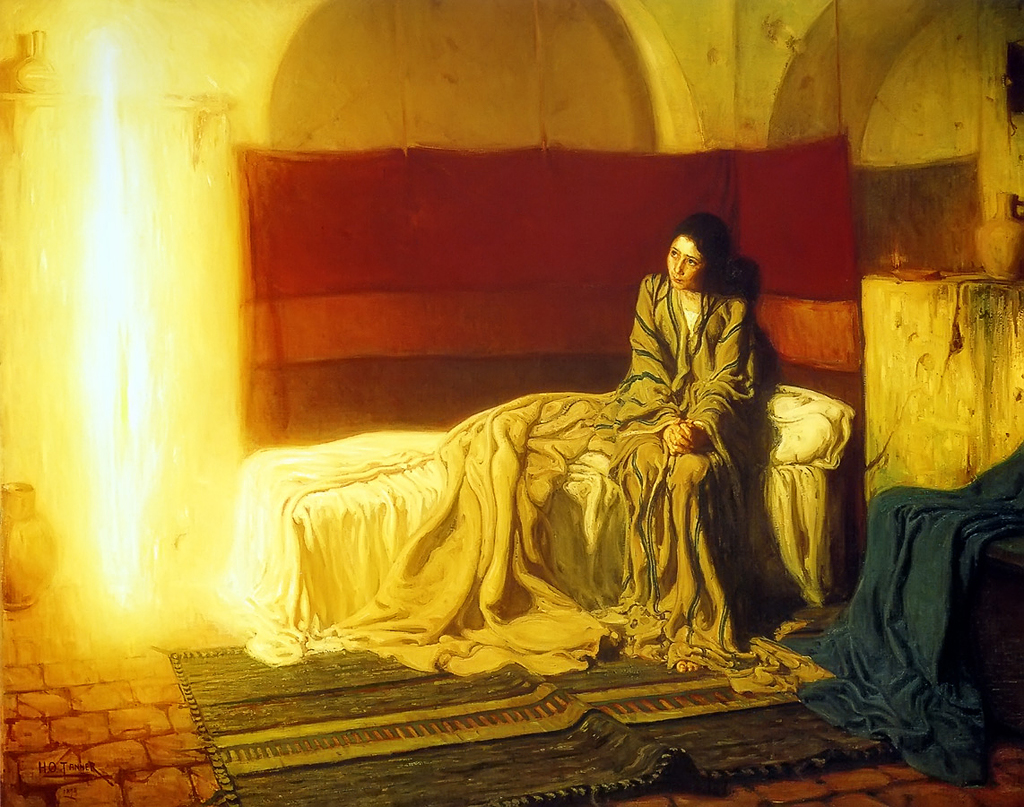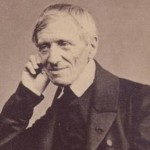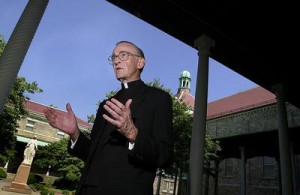Nine years ago, I wrote my Master’s thesis on homosexuality. Why did I choose this topic (and lose so much sleep writing it)? Because I knew what the Church taught, believed it and fully supported it, but didn’t know why she taught it.
I’m not the only one. You have questions, our children have questions, and our friends and coworkers have questions. Not just about homosexuality, but about so many things. We all have questions because God wants us to understand. That’s right, we’re meant to know and understand the reasons. That’s why Archbishop Sheen says we hate having secrets kept from us… because we’re meant to know.
Today’s homily isn’t about homosexuality but about understanding our faith. Now I think there are two dangers when it comes to understanding our faith:
1) we don’t understand what we believe. On many topics, most people don’t even know what the Church believes. I can probably count on one hand the number of people I’ve met who actually know what the Church teaches, for example, on homosexuality. Even some priests don’t know it well.
And let’s say we know the teaching, which is great. But sometimes we don’t understand the reasons why. We may fall back on the idea, “That’s just what I believe,” or “That’s the way I was raised,” which is okay, but keep in mind that these reasons are not enough to persuade other people, not enough to teach our children, and not enough to joyfully and fully embrace the Church’s teaching.
2) The other danger is not trusting God or the Church. We ask questions, but we’re not really trying to understand. I’ve met a many people who ask questions but don’t want to listen; actually they just like poking holes in arguments while not providing anything better. They go in with the assumption: the Church is wrong, the Church should get with the times, and don’t want to hear what we have to say. With this mindset, it’s obvious that they’ll never understand what we believe and why.
In the Gospel today, we see the best approach given by our Mother Mary. When the angel, St. Gabriel, says that she will conceive Jesus, our mother asks, “How can this be?” She’s not “questioning God’s ability to give her a son, but she is asking how such a plan will unfold. Her question… proceeds from faith and seeks to understand God’s action, not to doubt it” (The Ignatius Catholic Study Bible, 105).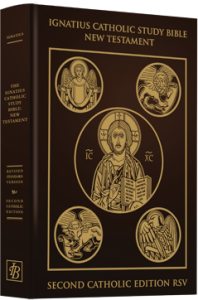
And here we come to the crux of the matter: questioning is not the same as doubting. Questioning means: “Jesus, I trust you and I want to understand the whys and the hows.” Doubting means: “I don’t trust you.” So ask questions! Some people think Catholics shouldn’t ask questions, which is nuts. We’ve never believed that. But don’t doubt. No relationship will survive when one person doesn’t trust the other.
Bl. John Henry Newman, the great Anglican theologian who became Catholic said, “Ten thousand difficulties do not make one doubt” (CCC 157). In other words, I might have difficulty understanding, but I don’t disbelieve it. I wrote my thesis on homosexual actions, never doubting the Church’s teaching, never doubting Jesus or the Bible’s capacity to teach the truth, but I wanted to understand why it’s true.
Msgr. William Smith, an amazing teacher at St. Joseph’s seminary in New York, taught me something I’ll never forget. You know how professors in college always say, “This course is the most important course you’ll take in college”? And the course always happens to be the course they’re teaching? Well Msgr. Smith said that the two most important courses we take in seminary are Christology (the study of Christ) and Ecclesiology (the study of the Church), and he didn’t even teach these! He taught moral theology! He said those two subjects are the most important because if you understand who Jesus is and who the Church is, then everything falls into place: we can trust that Jesus is God and doesn’t lie to us, that Jesus founded the Church and guides her, and that the Church, when she teaches authoritatively on matters of faith and morals, is protected from giving the wrong answer.
That’s why the homily I gave called, “Jesus Like Organized Religion,” where we talked about Jesus founding the Catholic Church, is so fundamental. If this makes sense to us, then we’ll trust the Church and not doubt her. If not, then we’ll always have a position of doubt and suspicion: “The Church might be wrong. And if she’s wrong on this, who knows about the rest?” The position of trust, however, asks questions, but more importantly seek answers.
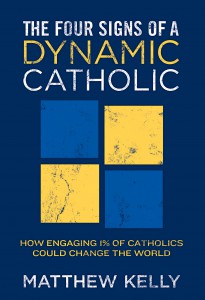 Did you know that Catholics who are highly engaged in their faith, 7% of Catholics in the USA, “have rigorously explored at least one question they’ve had about Catholicism”? “More than just asking someone about their questions or searching for a quick answer on the Internet, they really threw themselves into the question or issue. This search for an answer to their most pressing question about the faith almost always brought with it two lessons. First, it is very hard to see the truth while you are in the middle of situation, especially if the situation is highly charged emotionally. There is a certain detachment that is needed to acknowledge the truth… We are more attached to our agendas and biases than we think… The second lesson is that disagreeing with the Church without a full examination of an issue is prideful and foolish… The 7% [that is, highly engaged Catholics]… have a position of humility… If they disagree with something the Church teaches, they approach the issue by exploring the question: Why does the Church teach what she teaches? They assume that it is unlikely that they know better than two thousand years of the best Catholic theologians and philosophers. They assume that they may be missing something and go searching for it…. Our capacity to seek, find, and adopt the truth is in direct proportion to our humility” (Matthew Kelly, The Four Signs of a Dynamic Catholic, 93)
Did you know that Catholics who are highly engaged in their faith, 7% of Catholics in the USA, “have rigorously explored at least one question they’ve had about Catholicism”? “More than just asking someone about their questions or searching for a quick answer on the Internet, they really threw themselves into the question or issue. This search for an answer to their most pressing question about the faith almost always brought with it two lessons. First, it is very hard to see the truth while you are in the middle of situation, especially if the situation is highly charged emotionally. There is a certain detachment that is needed to acknowledge the truth… We are more attached to our agendas and biases than we think… The second lesson is that disagreeing with the Church without a full examination of an issue is prideful and foolish… The 7% [that is, highly engaged Catholics]… have a position of humility… If they disagree with something the Church teaches, they approach the issue by exploring the question: Why does the Church teach what she teaches? They assume that it is unlikely that they know better than two thousand years of the best Catholic theologians and philosophers. They assume that they may be missing something and go searching for it…. Our capacity to seek, find, and adopt the truth is in direct proportion to our humility” (Matthew Kelly, The Four Signs of a Dynamic Catholic, 93)
Seek answers! Just because your mom and dad don’t know the answer, just because your wife can’t give you a solid answer doesn’t mean the answer isn’t out there. The onus is on us to find it.
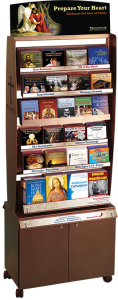 To help us is a new friend to our parish: Lighthouse Catholic Media. The kiosk will always be available at the back of the church with tons of the best talks, CDs and books available: relevant topics presented in everyday language that are interesting and engaging. Months ago I talked about this booklet “Living the Mass”: it’s amazing, it changed the way I receive Communion, and taught me about listening, prayer and my relationship with Jesus. I’ll put out more CDs next week on other topics, and I’d love your feedback.
To help us is a new friend to our parish: Lighthouse Catholic Media. The kiosk will always be available at the back of the church with tons of the best talks, CDs and books available: relevant topics presented in everyday language that are interesting and engaging. Months ago I talked about this booklet “Living the Mass”: it’s amazing, it changed the way I receive Communion, and taught me about listening, prayer and my relationship with Jesus. I’ll put out more CDs next week on other topics, and I’d love your feedback.
It’s so much fun learning about Catholicism! Writing my thesis enriched my life: I understood better the truths about human nature, sexuality, and love.
If we don’t understand something about our faith, it could be because we’re not seeking. Why? Because Jesus guarantees that when we seek, we will find (Mt 7:7-8). Ask questions, seek answers, but don’t doubt.
